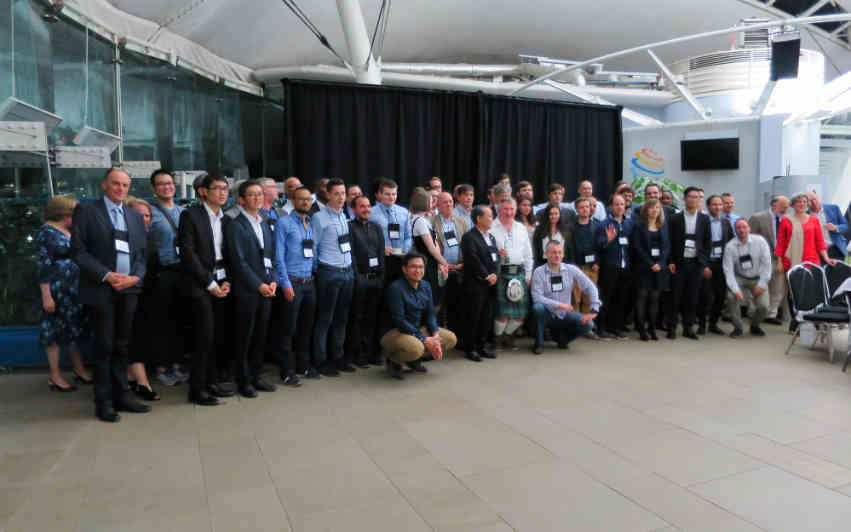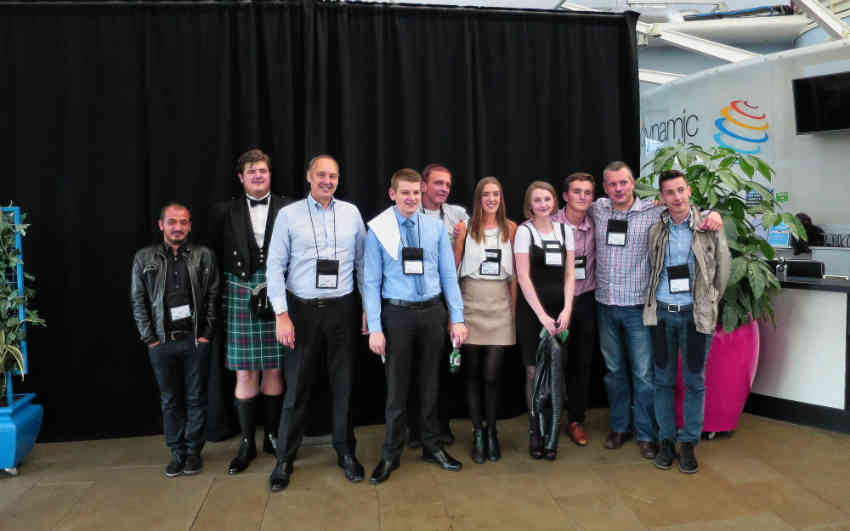07 September 2016
|
Over 250 people from no less than 31 countries took part in the 12th International Institute of Refrigeration Gustav Lorentzen Natural Working Fluids Conference in Edinburgh in August this year.
The event, organised by the Institute of Refrigeration, attracted a higher than usual number of student delegates 52 of presenters and attendees were young researchers, students or engineers new to the industry.
Andy Pearson, IOR Technical Committee Chairman and Chair of the Conference, remarked:
The event, organised by the Institute of Refrigeration, attracted a higher than usual number of student delegates 52 of presenters and attendees were young researchers, students or engineers new to the industry.
Andy Pearson, IOR Technical Committee Chairman and Chair of the Conference, remarked:
“I was impressed with all the students that attended. Currently, refrigeration is an area where problems are becoming more difficult to solve and it is great to see the students beginning their journey and participating in tackling these issues.
"The industry is dependent on students coming through, moving forward and taking on roles of responsibility in the years to come. We have to develop and help these young people along, because in twenty years it will be them on the stage encouraging the next generation of researchers and engineers.”
Student Authors
Of the 147 technical presented nearly 15% percent were written by student authors. To recognise this significant contribution to the programme and the outstanding standard of some of these papers, the conference planning group decided to offer prizes for the best paper by a student author. One winner was identified by a team of international judges, in each of the three conference streams, with an overall winner being chosen from this short list.
The winning students were:
Mazyar Karampour, Royal Institute of Technology in Sweden, for the best student paper on the theme of sustainability 'Integration of heating and air conditioning into a CO2 transcritical booster system with parallel compression - Part II: Performance analysis based on field measurements'. Mazar was also the winner of the best overall paper by a student author.
Laura Nebot-Andrés, Jaume I University in Spain, for the best paper on the theme of natural working fluids 'Experimental evaluation of a dedicated mechanical subcooling system in a CO2 transcritical refrigeration cycle'.
Meng Wang, Delft University of Technology in the Netherlands, for the best paper on the theme of alternative cycles 'Performance prediction of single-effect absorption heat pump cycles using ionic liquids'.
Content continues after advertisements
Student Networking
In order to encourage all of the young researchers to make contacts amongst the 200 delegates and help them develop their career, a student networking dinner was organised. The format for the event enabled the researchers to meet a large number of the leading refrigeration scientists and key note speakers who were also present at the conference. During the dinner the researchers moved around the tables, opening conversations with different people from lots of different countries from industry and from University research departments.
Conversations covered topic such as careers advice, next stages in research and how to make useful networking contacts. These informal sessions have become a regular feather at the international conferences arranged by both the Institute of Refrigeration and the International Institute.
Dr Ina Colombo, Deputy Director of the International Institute of Refrigeration, introduced the session and was impressed with how much those taking part in this activity gained from it.
Conversations covered topic such as careers advice, next stages in research and how to make useful networking contacts. These informal sessions have become a regular feather at the international conferences arranged by both the Institute of Refrigeration and the International Institute.
Dr Ina Colombo, Deputy Director of the International Institute of Refrigeration, introduced the session and was impressed with how much those taking part in this activity gained from it.
“The young researchers know exactly who they want to talk to and with this event, we can make sure they meet these individuals. I am very glad to have been part of this networking.”
Young Engineers
It wasn't just the students from the world’s leading University Research Departments who gained from taking part in the event.
The conference planning team recruited 10 young engineers from industry who demonstrated potential to take part as Conference Assistants – a responsible role throughout the event involving supporting conference speaker presentations, sitting in on key note talks and feeding back to organisers.
The Assistants made a strong impression on the speakers for their diligence and interest in contributing to discussion throughout the event. In recognition of the contribution that these young people made to the success of the conference the IOR has agreed to offer them free membership at the new Young Persons grade.
The conference planning team recruited 10 young engineers from industry who demonstrated potential to take part as Conference Assistants – a responsible role throughout the event involving supporting conference speaker presentations, sitting in on key note talks and feeding back to organisers.
The Assistants made a strong impression on the speakers for their diligence and interest in contributing to discussion throughout the event. In recognition of the contribution that these young people made to the success of the conference the IOR has agreed to offer them free membership at the new Young Persons grade.
To find out more about the conference programme and papers and read the keynote and winning student presentations see the conference website www.gl2016.com. The next Gustav Lorentzen conference will take place in 2018 in Valencia, Spain.









